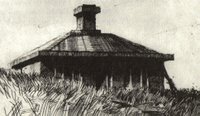
My Friend Ruth
Ruth grew up in Reykvavik, and she has shared some of her favorite things about Iceland with me. It was Ruth who introduced me to Summer at Little Lava and Dreaming of Iceland (see reviews in earlier postings). She contacted her brother Petur, who sent me some travel brochures. Ruth and Jim had us over for dessert, and treated us to Ponnukokurs. Ruth tells me that her favorite things to do when she goes back to visit Iceland are: walking along the main streets of Reykjavik, swimming, and talking with friends and family. She was preparing for a yard sale recently, and found an Icelandic puzzle which she gave us--haven't put it together yet, but we will have fun doing so! As she owns a bookstore, Ruth and I spend many hours talking about our favorite books. I was able to introduce her to Bill Holm, and she particularly enjoyed Eccentric Islands and the Boxelder Bug Variations.
Icelandic Pönnukökurs (Pancakes)
(Oli Olafsson’s mothers recipe, from the Icelandic Association of Utah.)
2 cups of flour
2 or 3 tablespoons of sugar (depending on taste or how much sugar you have)
1 or 2 eggs (two eggs if you have them, one egg otherwise)
1 teaspoon of baking powder
3 or 3 ½ ounces (50-100 grams) of melted margarine
A touch of vanilla or cardamom seeds (according to taste)
Milk to thin the batter
Mix ingredients. Thin with milk until the batter is just thicker than the milk.
You will need a special Icelandic-pancake pan. [note: a crepe pan should work]
It’s about 7 ½ inches in diameter and has a 1/8 inch ridge, which keeps the batter in the pan.
On a burner that’s larger than the pan, heat the pan until the pan is so hot that the batter will almost boil when you pour it into the pan. (When the batter boils, small holes appear in the pancake. (The holes allow the jam and cream to ooze properly.)
Place a small “scraping” bowl near the bowl of batter. Ladle the batter onto the hot pan. Quickly tilt the pan so that excess batter pours back into the bowl of batter. Using a butter knife, scrape excess batter from the lip and edge of the pan. Scrape the batter off the knife, into the scraping bowl. Place the pan in the center of the burner.
Cook the batter until holes appear uniformly in the pancake, until the pancake is golden brown. This step typically takes less than a minute. While the pancake is cooking, quickly run the pointed knife around the edge of the pancake. (This step makes sure that the pancake doesn’t stick to the side or lip of the pan when you are ready to flip the pancake.)
Lift the pan off the burner, slide the sharp-pointed knife an inch or so under the edge of the pancake and lift up slightly, to begin freeing the pancake from the pan. Continue moving and lifting the knife until the pancake is completely unstuck from the pan. Place the knife in the center of the pancake and then flip the pancake, so that the uncooked side of the pancake is now against the hot pan. Place the pan on the burner and finish cooking the pancake. This step happens quickly, in thirty seconds or so. (If you overcook the pancake, it becomes stiff and breaks when you try to fold it.)
Remove the pan from the burner and turn the pan upside down over the plate, flipping the pancake onto the plate.
Adjust the heat as you cook so that the pancakes cook a golden brown but don’t burn. Using a spoon, place a teaspoon or so of jam in the center of the pancake. Then place a tablespoon or so of whipped cream on the jam. Fold the pancake in half, so that the pancake looks like a half moon. Fold the pancake again, so that it looks like a wedge of pie. Using a fork, enjoy the pancake.
If you prefer sugar to jam and whipped cream, sprinkle sugar onto the pancake. Then roll the pancake and fold it in half.





